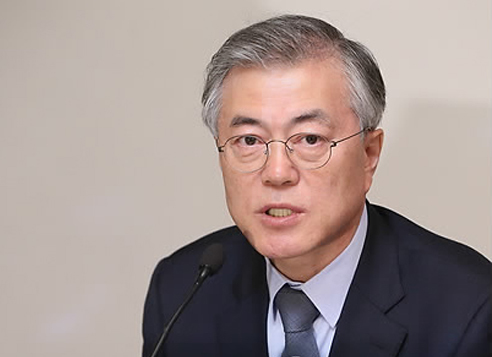Discord over the issue of irregular workers has exposed a rift in relations between the Moon Jae-in administration and business circles.
The new liberal government has not been supposed to be business-friendly as the appointment of key economic policymakers reflects Moon’s resolve to implement his campaign pledge to reform the country’s large family-run conglomerates known as chaebol.
The new liberal government has not been supposed to be business-friendly as the appointment of key economic policymakers reflects Moon’s resolve to implement his campaign pledge to reform the country’s large family-run conglomerates known as chaebol.

But the heavy-handed reaction by Moon and his aides to criticism by a local employers’ group of the president’s initiative to turn irregular jobs into regular ones has deepened concerns that his administration’s communication with businesses may be one-sided and counterproductive to achieving its employment and economic goals.
Moon came forward Friday to rebut an argument made by the vice head of the Korea Employers Federation a day earlier that taking a dichotomous approach that views regular and irregular jobs as good and bad regardless of the work involved would fan conflict and lead to job cuts.
The president was quoted by his spokesman as saying the employers’ organization should feel responsible for the social polarization caused by regular and irregular employment and engage in serious self-reflection before making criticisms.
Kim Jin-pyo, the chief of a commission functioning as the Moon administration’s de facto transition team, said in an interview with a local news agency Sunday that chaebol enjoy the greatest advantages in the country, and must first reflect how they can help achieve social harmony.
The remarks appeared contradictory to Moon’s effort to encourage free-wheeling debate in the decision-making process of his administration.
In his first meeting with senior presidential secretaries Thursday, Moon said it was their “duty” to raise objections to his views and directives.
“Under the circumstances that the president sees little problem with applying double standards, businesses can hardly be expected to express views that are different from the government’s position,” said a corporate executive, requesting anonymity.
Moon’s spokesman said the KEF’s argument could create the misunderstanding that the new administration was seeking to impose its employment policy on private firms.
But the president apparently put pressure on them when he told staff to highlight companies with large numbers of irregular employees during an event last week to install an electronic bulletin board offering a quick summary of job market conditions.
With youth unemployment reaching record high levels in recent months, Moon has cast himself as a jobs president by pledging to create 810,000 jobs in the public sector and turn all public-sector irregular jobs into regular ones by the end of his five-year term.
He seems to view the criticism from the employers’ organization as threatening to derail one of his signature policies.
But the KEF makes the point that the country’s economic polarization is more attributable to wage gaps between large corporations and small and medium-sized enterprises than between regular and irregular workers.
According to data from the Employment and Labor Ministry, the average annual wage of companies with 300 and more employees rose from 4.8 million won ($4,290) in 1987 to 61.23 million won in 2015, while the corresponding figure for firms hiring less than 300 workers increased from 4.38 million won to 35.81 million won over the cited period.
A KEF study showed the average wage for irregular workers at large corporations was larger than the sum received by regular employees at SMEs.
The Moon administration also uses a broader definition of irregular workers than the national statistical agency, meaning the numbers are substantially higher.
Irregular workers’ proportion of the country’s total workforce stood at 32.8 percent as of August last year, according to Statistics Korea. But Moon has adopted the estimate by labor groups at 44.5 percent, including indirect employment, with the KEF putting the ratio at 14.9 percent.
Experts call on Moon and his aides to sit together with businesses to seek ways of reducing irregular jobs and increasing quality jobs.
“Business circles and the government should communicate, not confront each other, on how to solve the job problem,” said Park Ji-soon, a professor at Korea University School of Law.
Close cooperation with corporate circles will be essential to achieve income-led growth, which Moon has suggested as a way to boost the economy held back by sluggish domestic consumption.
The Moon administration seems to be pushing employers to make concessions before it persuades unionized regular workers at large companies to concede their vested rights.
But experts say it should hold discussions on the job market reform with business circles and labor unions at the same time and push through deregulation if it is to create more quality jobs in the long run.
Shin Se-don, a professor of economics at Sookmyung Women’s University, said it would be more reasonable to improve working conditions based on the principle of paying the same wages for the same work and acknowledge the need to adopt various types of employment, rather than adhering to an unconditional shift to a regular job status.
The issue of irregular jobs would also be an inefficient way of expediting chaebol reform, commenters say, as most irregular staff are at smaller firms.
About 95 percent of the country’s 6.44 million irregular workers, as estimated by the state statistics office last year, were hired by small and midsized enterprises, which account for 90 percent of KEF members.
While large profitable companies could afford to give regular status to their irregular employees, such a move would put many SMEs, for which Moon has promised to strengthen support, at risk of bankruptcy.
By Kim Kyung-ho (khkim@heraldcorp.com)
-
Articles by Korea Herald








![[KH Explains] How should Korea adjust its trade defenses against Chinese EVs?](http://res.heraldm.com/phpwas/restmb_idxmake.php?idx=644&simg=/content/image/2024/04/15/20240415050562_0.jpg&u=20240415144419)











![[Today’s K-pop] Stray Kids to return soon: report](http://res.heraldm.com/phpwas/restmb_idxmake.php?idx=642&simg=/content/image/2024/04/16/20240416050713_0.jpg&u=)